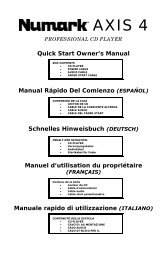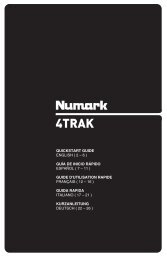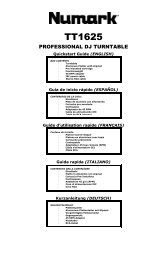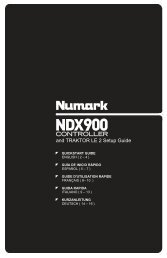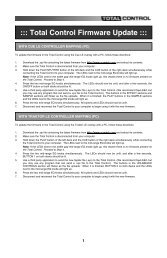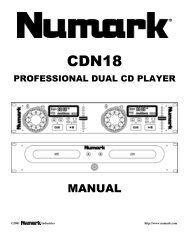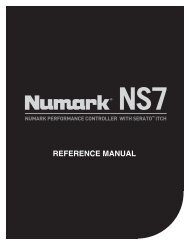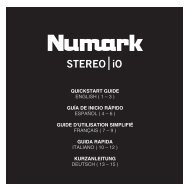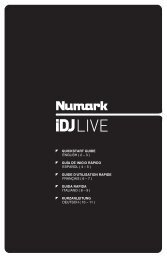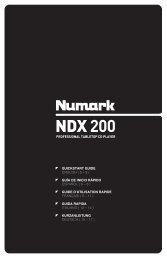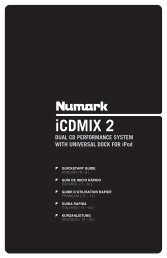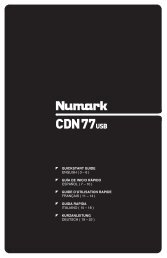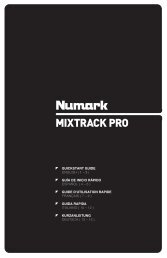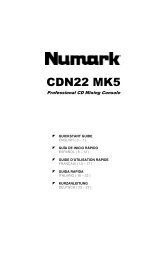DM 1885X STEREO MIXER OWNER'S MANUAL - Numark
DM 1885X STEREO MIXER OWNER'S MANUAL - Numark
DM 1885X STEREO MIXER OWNER'S MANUAL - Numark
You also want an ePaper? Increase the reach of your titles
YUMPU automatically turns print PDFs into web optimized ePapers that Google loves.
Professional Disc Jockey Products<br />
<strong>DM</strong> <strong>1885X</strong> <strong>STEREO</strong> <strong>MIXER</strong><br />
OWNER’S <strong>MANUAL</strong><br />
NUMARK INDUSTRIES<br />
11 Helmsman Road, North Kingstown RI 02852 http://www.numark.com
<strong>DM</strong><strong>1885X</strong><br />
<strong>Numark</strong> - The Proven Leader in DJ Technology<br />
©1997 <strong>Numark</strong> Industries 2 http://www.numark.com
CAUTION<br />
RISK OF ELECTRIC SHOCK<br />
DO NOT OPEN<br />
CAUTION: TO REDUCE THE RISK OF ELECTRIC<br />
SHOCK DO NOT REMOVE ANY COVER. NO USER-<br />
SERVICEABLE PARTS INSIDE. REFER SERVICING TO<br />
QUALIFIED SERVICE PERSONNEL ONLY.<br />
The lightning flash with arrowhead symbol within the<br />
equilateral triangle is intended to alert the user to the presence<br />
of un-insulated “dangerous voltage” within the product’s<br />
enclosure that may be of sufficient magnitude to constitute<br />
a risk of electric shock to persons.<br />
The exclamation point within the equilateral triangle is intended<br />
to alert the user to the presence of important operating and<br />
maintenance (servicing) instructions in the literature<br />
accompanying this appliance.<br />
CAUTION<br />
FOR USA & CANADIAN MODELS ONLY<br />
TO PREVENT ELECTRIC SHOCK DO NOT USE THIS<br />
(POLARIZED) PLUG WITH AN EXTENSION CORD, RECEPTACLE<br />
OR OTHER OUTLET UNLESS THE BLADES CAN BE FULLY<br />
INSERTED TO PREVENT BLADE EXPOSURE.<br />
SAFETY INSTRUCTIONS<br />
1. Read Instructions - All the safety and operating<br />
instructions should be read before this product is<br />
connected and used.<br />
2. Retain Instructions - The safety and operating<br />
instructions should be kept for future reference.<br />
3. Heed Warnings - All warnings on this product and in<br />
these operating instructions should be followed.<br />
4. Follow Instructions - All operating and other<br />
instructions should be followed.<br />
5. Water and Moisture - This product should be kept<br />
away from direct contact with liquids.<br />
<strong>DM</strong><strong>1885X</strong><br />
6. Heat - Avoid placing this product too close to<br />
any high heat sources such as radiators.<br />
7. Power Sources - This product should be<br />
connected to a power supply only of the type<br />
described in these operating instructions, or as<br />
marked on the unit.<br />
8. Power Cord Protection - Power supply cords<br />
should be routed so that they are not likely to<br />
be walked upon or pinched by items placed on<br />
or against them. When removing the cord from a<br />
power outlet be sure to remove it by holding the<br />
plug attachment and not by pulling on the cord.<br />
9. Object and Liquid Entry - Take care that<br />
objects do not fall into and that liquids are not<br />
spilled into the inside of the mixer.<br />
10. Damage Requiring Service - This product<br />
should be serviced only by qualified personnel.<br />
If you have any questions about service<br />
please contact <strong>Numark</strong> at the number(s) shown<br />
on the back cover of this manual.<br />
11. Grounding or Polarization - Precautions<br />
should be taken so that the grounding or<br />
polarization means built into the mixer is not<br />
defeated.<br />
12. Internal/External Voltage Selectors - Internal<br />
or external voltage selector switches, if any,<br />
should only be reset and re-equipped with a<br />
proper plug for alternative voltage by a qualified<br />
service technician. Do not attempt to alter this<br />
yourself.<br />
NOTE: This apparatus does not exceed the<br />
Class A/Class B (whichever is applicable)<br />
limits for radio noise emissions from digital<br />
apparatus as set out in the radio interference<br />
regulations of the Canadian Department of<br />
Communications.<br />
WARNING: To reduce the risk of fire or electric<br />
shock, do not expose this appliance to rain or<br />
moisture. Electrical equipment should NEVER be<br />
kept or stored in damp environments.<br />
Please record the serial number of your unit as shown on the back of the chassis as well as the name of the<br />
dealer from whom you purchased the unit. Retain this information for your records. Please return the<br />
warranty card enclosed to register your mixer with us.<br />
MODEL: <strong>DM</strong><strong>1885X</strong> PURCHASED FROM:_________________________<br />
SERIAL NUMBER:__________________ DATE OF PURCHASE:________________________<br />
<strong>Numark</strong> - The Proven Leader in DJ Technology<br />
©1997 <strong>Numark</strong> Industries 3 http://www.numark.com
<strong>DM</strong><strong>1885X</strong><br />
NUMARK <strong>DM</strong><strong>1885X</strong> <strong>STEREO</strong> <strong>MIXER</strong><br />
INDEX<br />
Safety Information Page 3<br />
Product Registration<br />
Introduction and Features Page 5<br />
Precautions Page 7<br />
Front Panel Diagram Page 8<br />
Sampler Operation Page 10<br />
Rear Panel Diagram Page 12<br />
Connection Instructions and Diagram Page 13<br />
Specifications Page 14<br />
Block Diagram Page 15<br />
Warranty and Service Page 16<br />
<strong>Numark</strong> - The Proven Leader in DJ Technology<br />
©1997 <strong>Numark</strong> Industries 4 http://www.numark.com
CONGRATULATIONS!<br />
<strong>DM</strong><strong>1885X</strong><br />
You have purchased the <strong>DM</strong><strong>1885X</strong> Stereo Mixer by <strong>Numark</strong>. This equipment features<br />
the latestest in sampling technology. With all new circuitry you get 4 assignable memory<br />
banks and editable sampling capability. You also get high quality audio output and<br />
better reliability than ever before. The<strong>DM</strong><strong>1885X</strong> Preamp Mixer has been designed by<br />
DJs for DJs. It gives you all of the controls and features you need in a professional piece<br />
of equipment to dazzle the crowd.<br />
Thank you for buying <strong>Numark</strong> DJ products!<br />
FEATURES...<br />
• User replaceable assignable ALPs crossfader .<br />
• Bass, Mid,Treble,and Gain controls on every input channel.<br />
• LeftRight Pan control on each channel and the DJ Mic.<br />
• Bass, Mid & Treble “KILL” switches for special effects and creative mixing.<br />
• Neutrik “Combo” connector allows 1/4” or XLR plug to be used for DJ Mic.<br />
• 8 line inputs.<br />
• Three phono inputs switchable to line level.<br />
• Sends on each channel for easily hooking up external effects.<br />
• Pushbutton Cueing with PFL (pre-fader listen) on each channel.<br />
• Headphone monitoring with PFL/Program fader.<br />
• Master and 2 Zone outputs.<br />
• Stereo/Mono switch on the Master and Zones.<br />
• Balanced Outputs.<br />
• Tape Out for direct recording.<br />
• Powerful stereo headphone output.<br />
• High-end performance audio signal.<br />
• 12V BNC light connector.<br />
Digital Sampler features:<br />
• Advanced Digital Processor by “Analog<br />
Devices” and DRAM memory provides true 16bit<br />
CD quality audio and powerful recording,<br />
editing and playback options.<br />
• Re-triggering for stuttering “rap”-style<br />
effects.<br />
• Effect Level Fader.<br />
• Large Start-Stop button.<br />
•Digital processor modes:<br />
-Edit (allows Intro and/or Outro trimming of the<br />
sample after it is recorded).<br />
-Single (sample plays once).<br />
-Repeat (loops sample until disengaged).<br />
-Stutter (for "stutters" and "stabs" in single or<br />
repeat mode).<br />
-Speed Control (plays sample faster or slower<br />
than originally recorded resulting in frequency shift).<br />
-Monitor (for monitoring sample with or without<br />
program or cue audio output).<br />
-Write (safely record a sample).<br />
<strong>Numark</strong> - The Proven Leader in DJ Technology<br />
©1997 <strong>Numark</strong> Industries 5 http://www.numark.com
<strong>DM</strong> <strong>1885X</strong><br />
As a special bonus we have<br />
included a right angle headhpone<br />
adapter with this mixer.<br />
Just plug your headphones into<br />
the adapter and then plug the<br />
adapter into your mixer.<br />
<strong>Numark</strong> - The Proven Leader in DJ Technology<br />
©1997 <strong>Numark</strong> Industries 6 http://www.numark.com
IMPORTANT INFORMATION...<br />
Please read this entire manual before connecting the <strong>DM</strong><strong>1885X</strong> to your system.<br />
For optimum performance:<br />
• Always make sure that AC power is OFF<br />
while making any connections.<br />
• Do not use excessively long cables (i.e.<br />
over 50ft/14m) Be sure plugs and jacks are<br />
tightly mated. Loose connections can cause<br />
hum, noise or intermittents that could easily<br />
damage your speakers.<br />
• Never use spray cleaners on the slide<br />
controls. Residues cause excessive dirt buildup<br />
and this will void your warranty. In normal<br />
use slide controls can last for many years. If<br />
they malfunction (usually because of a dirty or<br />
dusty environment) consult a professional<br />
technician.<br />
• Never attempt to make any adjustments or<br />
repairs other than those described in this<br />
manual. Take the <strong>DM</strong><strong>1885X</strong> to your dealer or to<br />
an authorized <strong>Numark</strong> Service Center.<br />
A NOTE ON CABLES:<br />
Make the input and output connections<br />
with readily available low-capacitance<br />
stereo cables. Quality cable makes a<br />
big difference in audio fidelity and<br />
punch. Use balanced connections<br />
whenever possible. See your <strong>Numark</strong><br />
dealer or an electronics or audio<br />
specialist store if you are not sure which<br />
cables to get.<br />
<strong>DM</strong><strong>1885X</strong><br />
SYSTEM PRECAUTIONS<br />
• Use appropriate cables throughout your<br />
system: Quality shielded audio cables and<br />
terminated shielded video cables, lowcapacitance<br />
preferred. Speaker cables must be<br />
14-gauge minimum; 12- or 10-gauge is better.<br />
• Reliability will be enhanced through the use<br />
of banana connectors on the speaker wires.<br />
Observe correct speaker wire polarity. If in<br />
doubt, consult your <strong>Numark</strong> dealer or a qualified<br />
technician.<br />
• Take care to connect only one cable at a<br />
time. Pay attention to the color-coded, labelled<br />
Input and Output jacks.<br />
• ALWAYS remember: “TURN AMPS ON<br />
LAST AND OFF FIRST”. Begin with master<br />
faders or volume controls on minimum and the<br />
amplifier gain/input control(s) down. Wait 8 to 10<br />
seconds before turning up the volume. This<br />
prevents transients which may cause severe<br />
speaker damage.<br />
• Use restraint when operating controls. Try to<br />
move them slowly. Rapid adjustments could<br />
damage speakers due to amplifier clipping.<br />
• Avoid amplifier “clipping” at all costs:<br />
this occurs when the red LEDs (usually on the<br />
front panel of most professional power<br />
amplifiers) start flashing. “Clipping” is when<br />
the power amplifier is distorting and working<br />
beyond it’s limits. Amplifier distortion is THE<br />
major cause of speaker failure.<br />
• To prevent fire or shock hazard, do not<br />
expose the unit to rain or moisture. Never<br />
place cans of beer, soda, glasses of water<br />
or anything wet on top of the mixer!<br />
<strong>Numark</strong> - The Proven Leader in DJ Technology<br />
©1997 <strong>Numark</strong> Industries 7 http://www.numark.com
<strong>DM</strong> <strong>1885X</strong><br />
<strong>DM</strong><strong>1885X</strong> FRONT PANEL DIAGRAM...<br />
3<br />
23<br />
5 6<br />
9 10<br />
7<br />
1<br />
2<br />
4<br />
8<br />
15<br />
11<br />
1. Channel Input Gain/Trim/Attenuation Controls.<br />
These control the sensitivity of the inputs for Channels 1-4.<br />
Use these whenever a particular source causes overload of<br />
the preamp inputs. Attenuation range is 0dB to -20dB. Use<br />
these with the PFL (pre-fader listen) monitor when cueing.<br />
2. Treble, Middle and Bass Controls fine tune the tone<br />
of your music through the sound system. Note that these<br />
are also available on the DJ Mic.<br />
3.Use the Pan Control to maximize the Left or Right side of<br />
your Source.<br />
4. Send button will send the individual channel signal to the<br />
onboard sampler and the send jack on the rear panel. This is<br />
used to route to an external effects unit. The signal comes<br />
back in from the effects unit through any line input channel<br />
you select and is then sent out to your amplifier through the<br />
Master Output jacks on the rear panel.<br />
17<br />
18<br />
16<br />
19<br />
20<br />
22<br />
29<br />
12 13<br />
26<br />
21<br />
27<br />
31<br />
32<br />
14<br />
25<br />
28<br />
30<br />
5. DJ Mic Talkover Switchhen engaged this mutes your<br />
music sources from channels 1-4. Releasing it brings you<br />
immediately back to full source level. It is very useful for<br />
announcements.<br />
6. Channels 1 - 4 Input Toggle Switches select which<br />
source will be live to that channel based on what you have<br />
connected to the rear panel input section.<br />
7.The Input Faders are low-noise, low-impedance, high-<br />
quality, smooth faders. These control individual source<br />
levels in the mix.<br />
8. Channel Cue Assign/PFL pushbuttons are used to<br />
route channel audio to the Monitor Section. The channel<br />
input faders do not control the Cue volume. When the Cue<br />
button is pushed you get Pre Fader Listen(PFL). In addition,<br />
when these buttons are depressed the third row of the LED<br />
meter (20) will display the signal level of that channel on a<br />
PFL basis. The level can be adjusted by using the Gain<br />
control (1).<br />
<strong>Numark</strong> - The Proven Leader in DJ Technology<br />
©1997 <strong>Numark</strong> Industries 8 http://www.numark.com
9. The Crossfader In/Out Pushbutton defeats the<br />
entire Crossfader function but leaves the Kill functions<br />
active.<br />
10. Crossfader/Kill Assign Switches lets you choose<br />
which input channel will be heard when the Crossfader is<br />
moved to the left or right and affected by the Kill function.<br />
11.The replaceable Crossfader achieves clean segues<br />
between two selected input channels.<br />
1 2 3 4 1 2 3 4<br />
In this example, Channel 1 is selected on the Left and<br />
Channel 3 is selected on the Right. With the Crossfader<br />
centered both assigned channels are live. Use the<br />
Crossfader for fast and seamless segues from one channel<br />
to the next.<br />
Note: the crossfader is user replaceable. Simply unscrew<br />
the two large screws which hold it in place, lift it out, and<br />
disconnect its cable. Reattach the new crossfader and<br />
screw it back onto the unit - you’re back in business!<br />
REPLACEMENT CROSSFADERS can be purchased from<br />
your local <strong>Numark</strong> Dealer, or by calling <strong>Numark</strong> Industries.<br />
12.The Cue Crossfader controls what signal is being<br />
monitored through your headphones. Move the slide<br />
control to the left and you will hear your source music from<br />
the channel(s) selected with the cue/PFL switch. Move the<br />
control to the right and you will hear your program mix, or<br />
output. The slide control allows fast and frequent<br />
headphone monitoring.<br />
13.The Headphone Level control sets the volume in your<br />
headphones.<br />
14.The Headphone Jack accepts a 1/4” plug and is set on<br />
the front of the unit.<br />
15. Kill Switches and LEDs have been provided for<br />
Treble, Mid and Bass Control on each side of the<br />
crossfader. This allows you to mute that frequency’s audio<br />
<strong>DM</strong><strong>1885X</strong><br />
output while leaving the other frequencies playing. This area<br />
is always active even when the crossfader is not. Try that for<br />
a neat effect, or mix one channel’s treble with another<br />
channel’s bass (by cutting the mid and bass on the first<br />
channel and the treble and mid on the other channel.)<br />
16. Master Level. This controls overall output level. Note that<br />
you can select (18) whether you want stereo or mono.<br />
17. The Zone Levels control speaker volume for other outputs<br />
such as control booth monitors, a tape deck, another<br />
amplifier, a sub-woofer, another mixer or a satellite speaker<br />
system. Note that you can select (18) whether you want<br />
stereo or mono.<br />
CONTRACTOR'S NOTE: Zone Level provides zone<br />
control in installations where there are two separate rooms<br />
(eg: a bar and a dance floor). The “Zone” volume should be<br />
controlled from the mixer not from the amplifier.<br />
18. The Stereo/Mono Toggle Switches allow you to select<br />
either stereo or mono output.<br />
19. Stereo Auto Peak Hold Level Meter. The red LEDs for<br />
+3, +5 and +8dB hold program peaks for an instant.<br />
With peak metering, it's OK to be "in the red" as long as +5 or<br />
+8dB isn't constantly lit. Set crossover, equalizer and power<br />
amplifier inputs to avoid distortion at each step in the audio<br />
chain. Proper attention to the peak meters results in the<br />
punchiest possible sound without audible distortion.<br />
20. PFL Meter. When the Cue/PFL switches are depressed<br />
this meter tracks pre-fader listen (PFL) signal for the channel<br />
selected instead of the mixer’s output level.<br />
21. 12V BNC Connector allows a 12 volt gooseneck style<br />
“<strong>Numark</strong>” light to be connected directly to the mixer.<br />
22. The Power button turns the unit on and off. Make sure<br />
your input faders (7) are turned down before you power up<br />
your mixer.<br />
23. The Mic Jack is a Neutrik “Combo Jack” and allows<br />
connection of either a 1/4” jack or an XLR jack. This is ideal<br />
for connecting an XLR Gooseneck directly.<br />
<strong>Numark</strong> - The Proven Leader in DJ Technology<br />
©1997 <strong>Numark</strong> Industries 9 http://www.numark.com
<strong>DM</strong> <strong>1885X</strong><br />
DIGITAL SAMPLER SECTION<br />
The Sampler uses dynamic RAM with a 16-bit<br />
microprocessor controller. The same digital signal<br />
processing components used in professional audio<br />
equipment deliver CD-quality samples.<br />
25. The Mode Pushbuttons switch from effect to<br />
effect. The accompanying LEDs illuminate to show you<br />
which specific mode you are in at any time.<br />
Modes are:<br />
• Repeat sets the unit to play back a sample and<br />
automatically repeat (loop) when it gets to the end of<br />
the sample.<br />
• Single sets the unit to play back a sample once.<br />
• Edit sets the unit to sample edit. This activates the<br />
Intro and Outro editing controls as described in<br />
#26. Edit can be used at the same time as Single<br />
and Repeat so that editing of the sample can be<br />
done while your program output is playing on the<br />
dance floor.<br />
• Write sets the unit to sampler record ready.<br />
Depress the appropriate send button for the channel<br />
you wish to record. Selecting a bank to record to and<br />
hit the Start/Stop button (#30) to begin recording<br />
(it is safer to actually choose your bank before going<br />
to write mode so that you don't accidentally wipe out<br />
an existing sample). The LED will stay lit while you are<br />
in Write mode. After you are done writing your<br />
sample you should select a play mode (either Single<br />
or Loop) and listen to your sample - note that you<br />
must do this manually by hitting the correct Mode<br />
Pushbutton.<br />
TO RECORD A SAMPLE<br />
<strong>Numark</strong> - The Proven Leader in DJ Technology<br />
a - Press the Write button once to go into stand by<br />
mode. The red LED will go on.<br />
b - Select the bank (or multiple banks) into which you want to<br />
record. Any bank can be selected. Each bank contains 3<br />
seconds of recording time. If you want to record a longer<br />
sample select multiple banks (they must be adjoining). To<br />
playback a multi-bank sample you must reselect the same<br />
banks later. Note: To overwrite an existing sample,<br />
select that bank instead of an empty bank. Changing bank<br />
selection at this point in time is possible and will not destroy<br />
any previously recorded samples.<br />
e - Hit the Start-Stop button to begin recording. It's red LED<br />
will light.<br />
f - Hit Start-Stop a second time to stop the sampling, or<br />
allow the memory banks to fill up, at which time sampling will<br />
stop automatically. Once your writing is complete the<br />
sampler will automatically switch to Single playback mode<br />
and light the Single LED. The sampler is now ready for<br />
playback.<br />
26. Intro and Outro editing controls are used when Edit<br />
mode is selected to fine tune the beginning (Intro) or<br />
ending (Outro) of your samples. These "trim" the<br />
unwanted sound while in Single or Repeat playback<br />
modes. Turn the controls inward to trim more - return them<br />
to their full outside position to return to your full sample.<br />
Once trimmed turn Edit off to lock-in your settings, now<br />
every time you select the sample it will be the perfect<br />
length. Note: Trimmed samples are not erased - they can<br />
be heard again by going back into Edit and undoing the<br />
trim. This powerful new feature allows you to start a sample<br />
early or end it late and still trim it to the perfect length<br />
without having to re-record. Since these controls can be<br />
active while the sample is "live", you can even fine tune<br />
samples on the fly. A way of efficiently trimming samples is<br />
by engaging the Stutter button and repeatedly hitting the<br />
Start-Stop button as you adjust the Intro knob.<br />
©1997 <strong>Numark</strong> Industries 10 http://www.numark.com
27. The Speed Control plays samples faster or slower<br />
resulting in a pitch shift of the sample. In the center<br />
position, the sample is played at recorded speed. Moving<br />
the knob to the left will slow down playback by up to 50%;<br />
moving the knob to the right will speed up the playback by<br />
up to 200%. Positions near the center provide fine<br />
changes in playback speed. Positions further from the<br />
center detent provide more drastic changes in playback<br />
speed.<br />
28. Effect Level Mix fader. This precisely sets the audible<br />
level of the sample in the mix.<br />
29. Memory Bank Select Pushbuttons A-D. Four<br />
banks are available for storing samples. To record a bank<br />
go to Write and then hit the bank button. You can record<br />
into any combination of banks by pressing multiple bank<br />
buttons.<br />
After sampling, you can either select the next bank and<br />
record it (remember Write is still on, just select the bank<br />
and hit Start/Stop) or you can manually select a playback<br />
mode.<br />
You can play any combination of the Memory Banks from<br />
left to right (that is, Memory Bank B will always play before<br />
Memory Bank D - but you can play ABCD; BC; BD: ACD;<br />
only C; only D; etc.).<br />
30. The large Start-Stop button controls sample recording<br />
and sample playback. The small red Effects Indicator LED<br />
glows when the sampler is "on". Here are the functions:<br />
• Tap the button when in sampler Write mode to begin<br />
sampling (the LED will light). Tapping it again ends the<br />
sample and the LED goes out. (unless the sampler has run<br />
out of memory and shuts off automatically - Once the<br />
Effects Indicator LED goes out, the Write LED goes<br />
out and the Single LED turns on.<br />
• In single or repeat play without Trigger, tap the button<br />
to play the sample and tap it again to stop the playback.<br />
Every time you play the sample, the music starts from the<br />
beginning of the sample.<br />
<strong>Numark</strong> - The Proven Leader in DJ Technology<br />
<strong>DM</strong><strong>1885X</strong><br />
• In Single or Repeat play with Trigger you are<br />
ready to "stab" samples. With the Trigger Out, the<br />
sample plays all the way through before you can play it<br />
again. With it In, you can stab or stutter a sample.<br />
When you shout "Rock it - rock the house!" and<br />
sample it, it can be played back as -<br />
R-R-R-R-R-R-R-Rock --<br />
Rock-Rock-Rock it - Rock it Rock it -<br />
Rock - - Rock it - rock the house!<br />
by simply "drumming" with your fingers.<br />
31. The Stutter Pushbutton lets you choose<br />
between two playback styles, Trigger and Non-<br />
Trigger, when in Single or Repeat modes.<br />
• When the Stutter is Out and the sampler is set to<br />
Single or Repeat mode, each time you tap the<br />
Start-Stop button the sample starts to play. The<br />
next tap stops sample playback. The next time play<br />
starts, the sample re-starts at the beginning.<br />
• When the Stutter is In and the sampler is set to<br />
Single or Repeat mode, each time you tap the Start-<br />
Stop button the sample re-triggers.<br />
ABOUT STUTTERING<br />
Expensive studio rack-mount samplers and sampling<br />
keyboards can re-trigger or stutter. This means<br />
"beginning at the start of the sample each time a key<br />
is pressed or a drum pad is struck".<br />
Re-triggering creates the stuttering "rap" effect. The<br />
<strong>DM</strong>1685/1885 includes a manual stuttering<br />
feature. How fast can you tap? Try using two fingers<br />
for increased speed.<br />
32. Monitor Pushbutton. To hear the sample or<br />
effect in the headphones, press this button.<br />
Program Mix still works and you will be able to hear<br />
any other input channels with the Cue buttons<br />
activated.<br />
©1997 <strong>Numark</strong> Industries 11 http://www.numark.com
<strong>DM</strong> <strong>1885X</strong><br />
<strong>DM</strong><strong>1885X</strong> REAR PANEL DIAGRAM...<br />
10<br />
11<br />
1. The Balanced Main Outputs are low-impedance XLR<br />
type connectors controlled by the Master fader.<br />
2. The Stereo Main Outputs are low-impedance RCA<br />
connectors controlled by the Master fader.<br />
1<br />
4 2 3 5<br />
3. The Tape Outputs are low-impedance unbalanced RCA<br />
jacks which output the program mix and allow you to<br />
connect any recording device.<br />
4. The Stereo Zone Outputs are low-impedance<br />
unbalanced RCA jacks controlled by the Zone Level<br />
controls.<br />
5. The Send can be attached to an external effects<br />
processor such as a sampler.<br />
6. Mic is the mic input for the Mic Channel and Channel 4.<br />
7. Channels 1-5 Line Inputs are unbalanced RCA jacks.<br />
The Line Input is selected with the toggle switch on the<br />
front panel. You can connect stereo audio from HiFi<br />
VCRs, cassette and reel-to-reel tape decks, DAT<br />
machines, CD players, laser discs, tuners, even<br />
synthesizers or other mixing consoles.<br />
NOTE: Plug mono audio sources into both Left and Right<br />
inputs using a “Y” cable connector.<br />
8<br />
7 7 7 9 7 9<br />
<strong>Numark</strong> - The Proven Leader in DJ Technology<br />
8<br />
7<br />
9<br />
12<br />
8. Line/Phono Input switch. Use this to allow line level<br />
equipment to be plugged into your phono inputs giving<br />
you a total of 8 line input options.<br />
9. Phono Inputs on Channels 1, 2 and 3 use<br />
unbalanced RCA jacks. Your input signal is fed directly to<br />
the <strong>DM</strong><strong>1885X</strong>'s high-quality RIAA phono preamplifiers<br />
so use this position only for moving magnet cartridges.<br />
Line level sources will overload the sensitive phono<br />
preamps and will sound very bad, so always be sure to<br />
toggle the line/phono switch over to line before<br />
connection of line sources.<br />
10. AC Cord. See safety precautions on page 3 for proper<br />
treatment of the power cord.<br />
11. Voltage Selector. Set this for the appropriate voltage<br />
in your area<br />
12. GND is the grounding lug for turntables 1, 2 and 3<br />
(phono inputs on Channels 1, 2 and 3). Always use this<br />
connection (your turntable cable should have a<br />
grounding wire).<br />
©1997 <strong>Numark</strong> Industries 12 http://www.numark.com<br />
6
<strong>DM</strong><strong>1885X</strong> Instructions for Connection and DIAGRAM...<br />
AC<br />
Outlet<br />
Zone 1<br />
Sound System<br />
w/ Amplifier<br />
Zone 2<br />
Sound System<br />
w/ Amplifier<br />
Main<br />
Sound System<br />
w/ Amplifier<br />
Tape Deck<br />
Tape Deck<br />
CD Player<br />
Sampling<br />
Keyboard<br />
Dual CD Player<br />
Turntable 1<br />
<strong>DM</strong><strong>1885X</strong><br />
Microphones<br />
Turntable 2<br />
Turntable 3<br />
1. Be sure the POWER (22) is OFF. All connections should be made before the unit is turned on. Always remember<br />
“Turn Amps on last and off first!”<br />
2. Use appropriate cables throughout your system: quality shielded audio cables, low capacitance preferred. Speaker<br />
cable must be 14-gauge minimum; 12- or 10-gauge is better.<br />
3. Connect your music sources on the rear of the unit. Up to 3 phono and 8 line sources (CD players, cassette decks,<br />
tuners, etc.) can be connected. When connecting to an input with a phono/line option switch remember to set the<br />
switch accordingly.<br />
4. Connect the ground wire from your turntables (and any other sources that come with a ground) to the ground post on<br />
the rear panel. This will eliminate most common hum and feedback problems.<br />
5. Connect your DJ mic on the front left side of the unit (23) or on the back of the unit at Mic 1. Connect your second mic at<br />
Mic 2 on the back of the unit.<br />
6. Connect your headphones on the front right side of the unit at (14).<br />
7. The OUTPUT MASTER jacks on the rear of the unit are for connecting to the amplifier. Use the balanced outputs if<br />
possible. Make sure you correctly attach the right and left cables to avoid phasing problems.<br />
<strong>Numark</strong> - The Proven Leader in DJ Technology<br />
©1997 <strong>Numark</strong> Industries 13 http://www.numark.com
<strong>DM</strong> <strong>1885X</strong><br />
SPECIFICATIONS...<br />
INPUTS:<br />
Line: 10kΩ input impedance<br />
100 mV rms sensitivity (for 1.22 V output)<br />
Mic: 10kΩ input impedance balanced/unbalanced<br />
3 mV rms sensitivity (for 1.22 V output)<br />
50 mV rms max input<br />
Phono: 47kΩ input impedance<br />
1.5 mV rms sensitivity @ 1 KHz (for 1.22 V<br />
OUTPUTS:<br />
output)<br />
Line: 9V rms max (+20 dBm)<br />
Headphone Amp: 5 watt into 47Ω<br />
Distortion less than .01%<br />
SIGNAL TO NOISE RATIOS<br />
(vs. maximum output):<br />
Line: Better than 82 dB<br />
Mic: Better than 75 dB<br />
Phono: Better than 75 dB<br />
FREQUENCY RESPONSE:<br />
Mic: 20 Hz- 15k Hz +_ .5 dB<br />
Line: 20 Hz- 20k Hz +_ .5 dB<br />
Phono: +_ 1 dB except for controlled attenuation of -3 dB<br />
CHANNEL EQ:<br />
@ 20 Hz to reduce rumble and feedback<br />
Bass: ±15db @80Hz<br />
Middle: ±10db @1KHz<br />
Treble: ±15db @12.5KHz<br />
TALKOVER ATTENUATION:<br />
Variable from no cut to -16 dB<br />
KILL EFFECTS:<br />
Bass: -54dB at 50 Hz, -3dB at 400 Hz<br />
Middle: -44dB at 1k Hz, -3dB at 200Hz<br />
Treble: -53dB at 15k Hz, -3dB at 2k Hz<br />
POWER CONSUMPTION:<br />
20 Watt typical, 28 watt with full headphone output<br />
SAMPLER:<br />
FREQUENCY RESPONSE AND SAMPLING RATE:<br />
Variable sampling rate 44.1 kHz with 16-bit sampling yields<br />
20Hz-22 kHz.<br />
MAXIMUM MEMORY TIME:<br />
12 seconds<br />
<strong>Numark</strong> - The Proven Leader in DJ Technology<br />
©1997 <strong>Numark</strong> Industries 14 http://www.numark.com
BLOCK DIAGRAM...<br />
<strong>Numark</strong> - The Proven Leader in DJ Technology<br />
<strong>DM</strong><strong>1885X</strong><br />
©1997 <strong>Numark</strong> Industries 15 http://www.numark.com
Professional Disc Jockey Products<br />
Warranty and Service Information<br />
<strong>Numark</strong> Industries, LLC and <strong>Numark</strong> International, Inc. (hereafter “<strong>Numark</strong>”) warrants each<br />
new product manufactured and/or supplied by it to be free from defects in material or<br />
workmanship under conditions of normal use and service for 360 days, beginning on the date of<br />
purchase from an authorized <strong>Numark</strong> Dealer, but not to exceed 2 years from date of shipment<br />
by <strong>Numark</strong>.<br />
The <strong>Numark</strong> obligation under this warranty is limited to repairing or replacing, at its option,<br />
the product or part(s) therein; which upon examination by <strong>Numark</strong> shall appear to be defective<br />
or not up to factory specifications; providing the <strong>Numark</strong> product is returned (transportation<br />
prepaid) to <strong>Numark</strong>.<br />
<strong>Numark</strong> shall not be liable for any damages, consequential or otherwise, resulting from the<br />
use and operation of this product and makes no other warranty(s) either express or implied on<br />
this product, including any warranty of merchantability.<br />
This warranty does not extend to any of our products which have been subjected to<br />
misuse, neglect, accident, incorrect wiring not our own, improper installation, or use in violation of<br />
instructions furnished by us, nor extended to units which have been repaired or altered outside<br />
of our factory, nor to cases where the serial number thereof has been removed, defaced, or<br />
changed, nor to accessories used therewith not of our own manufacture. <strong>Numark</strong> reserves the<br />
right to make changes or improvements in its products, during subsequent production, without<br />
incurring the obligation to install such changes or improvements on previously manufactured<br />
equipment.<br />
To place this warranty into effect, the enclosed WARRANTY REGISTRATION CARD<br />
must be returned to <strong>Numark</strong> Industries, LLC within thirty (30) days after date of purchase.This<br />
warranty gives you specific legal rights, and you may also have other rights which vary from<br />
state to state.Some states do not allow the exclusion or limitation of incidental or consequential<br />
damages so the above limitation or exclusion may not apply to you.<br />
EQUIPMENT TRANSPORT<br />
A Return Authorization number should be obtained from <strong>Numark</strong> through the addresses or<br />
phone numbers below.<br />
It is the customer’s obligation, when returning faulty equipment, to properly pack the<br />
<strong>Numark</strong> equipment in its original packaging. Failure to do so may inadequately protect the<br />
equipment in transit and, therefore, jeopardize the customer’s warranty. The defective <strong>Numark</strong><br />
equipment should be sent, FREIGHT PREPAID with Return Authorization number to:<br />
NUMARK INDUSTRIES<br />
11 Helmsman Road<br />
North Kinstown, RI 02852 USA<br />
Attention: Service Department<br />
Telephone: +1 (401) 295-9000<br />
Fax: +1 (401) 295-5200<br />
E-mail: service@numark.com



